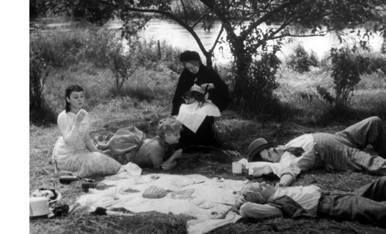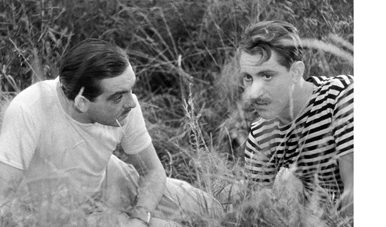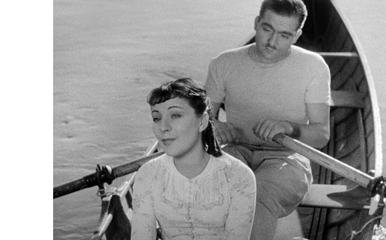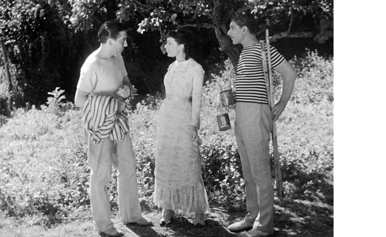
 |
|
|
|
Classic movies don't come any more French than A Day in the Country, Jean Renoir's short feature filmed in 1936 and completed a full ten years later. Adapted from a Guy de Maupassant story, the show is hailed as a masterpiece for its naturalistic performances and easygoing style, but also because critics relate its breezy look directly to its director's heritage as the son of the famous painter. Its belated debut in 1946 must have carried a strong feeling of nostalgia and nationalistic pride, for a country just out of six years of war. 
At 41 minutes the film is incomplete, although Renoir did not intend it to be much longer. It takes place before the turn of the century in the late 1800s. A storekeeper shuts down his business, borrows the milkman's wagon and takes the family out to the sticks to enjoy a country picnic. Monsieur Dufour (Gabriello) finds a rural restaurant next to a calm stream; he and his assistant Anatole (Paul Temps) are eager to go fishing. Dufour's wife (Jeanne Marken) and daughter Henriette (Sylvia Bataille) take it easy and play like children. Swinging in the swings, they catch the eye of two young men eager for female conquest. Rodolphe (Jacques Borel) is the brasher of the two but he ends up in a cozy boat with the mother. In a second boat, the quieter Henri (Georges Saint-Saens) is given custody of Henriette. Busy fishing, Anatole and the father are blind to what should be obvious. It's assumed that Henriette will marry the boorish Anatole, which is perhaps why she seems so receptive to Henri's advances. A Day in the Country dispenses with heavy plotting and complex characterizations; the film is not much more than an Idyll by a sunny brook, on the kind of day that is so perfect that people shed their normal behaviors, and allow for life-changing accidents. Everyone's in a good mood; even grand' mère, along for the ride mainly to mis-hear all that is said, has a fine time. The restaurateur (Jean Renoir himself) is happy to serve and the two skirt-chasers are essentially inoffensive. Both men immediately gravitate toward Henriette. The overeager Rudolphe prances around like a faun, but = isn't seriously put out to find himself paired up with the chubby, giggling Madame Dufour. When the spirit is calling, it seems any woman will do. And this is a French movie. 
The lack of artificial conflict allows Renoir to pull us into his lyrical mood. When the potential lovers drift away the drama becomes internal. Afloat on a boat away from the world and alone with a strange man... it's as if all the restraints of life no longer count. Filmed in real locations, most of the show is staged at middle distance and in depth. But when Henriette succumbs to her lover the show suddenly switches to shallow-focus extreme close-up, to catch intimate views of changes in her expression. She seems to feel not passion, but a realization that she's making love... that this is really happening. Then it's over, the rain comes, and we know that feeling too. As the movie was never properly finished by Renoir, and only assembled ten years later, awkward title cards cover two continuity breaks. Renoir didn't edit the film or approve of its final form but it still seems one of his most distinctive movies, perfect in its way. Unlike many French films of the time, the sound was all recorded direct, preserving the original performances both image and voice. We're told that rain and money issues interrupted the filming, and then Renoir left for another project leaving this film incomplete. What should have been a masterpiece was later abandoned when the Nazis advanced and the producer had to flee France. Actress Sylvia Bataille was sorely disappointed, as she would have become a film star had the film only been released. Ten years later it was a hit, and soon gained a reputation as a core title in French film history. Jean Renoir himself did not see it until four years after its release. For a film classic that almost never was, the Criterion Collection's Blu-ray of A Day in the Country looks quite good. It's a pleasing B&W scan of a film that A Day in the Country. The restored image looks its age but is in very good shape; and the audio track is far better than that on old 16mm prints. Cinematographer Claude Renoir was only 23 but his images capture a painter's vision of the French countryside, without emulating the paintings themselves. Of special mention is Joseph Kosma's music, the subtle beauty of which comes through in the wordless pastoral scenes. Kosma had composed the music for most of Renoir's films, so Day feels like his work even though the editorial was accomplished with no director input whatsoever. 
Criterion's extras make a big difference in our appreciation of this picture. The director is usually rather reserved in those filmed 1962 introductions, but in this one he instead gets quite excited talking about the freedom to do whatever he wanted with the story. He seems so enthusiastic about it after the fact, that we wonder how he could have walked away from it. Producer Pierre Braunberger tells the film's problematic story from his point of view, 43 years later. He sounds delighted that it was ever finished at all. Author Christopher Faulkner tells the story of A Day in the Country in both an interview and video essay. He makes a good case for Renoir using this film to resolve his issues with his famous father. Faulkner knows the subject well and takes pains to contradict a number of myths, such as the notion that the movie's fresh performances were the result of a Renoir experiment in improvisation. 
To our benefit, producer Braunberger retained all 4.5 hours of negative picture and sound outs for the film, which much later were whittled down to 89 minutes of outtakes, plus a reel of screen tests. All of this is present on the disc, and Faulkner uses a selection of outtakes for a separate new video essay. It's an opportunity to see a master director at work, similar to the marathon of outtakes and alternate scenes that proved a revelation for Charles Laughton's The Night of the Hunter. There's no sign of dialogue being improvised; the actors play directly to the script. Renoir also finds his angles and sticks with them. When he does change things, it's when something isn't working, to make the angle better suit the action he needs to show. One observation that does stick close to the legend can be seen in the stage waits and trims -- everybody seems to be having a good time. Future directors Luchino Visconti and Jacques Becker were Renoir's assistants, and Becker can be seen now and then manning the camera slate. Henri Cartier-Bresson also assisted, and plays a bit role as a passing seminary student. 
On a scale of Excellent, Good, Fair, and Poor,

The version of this review on the Savant main site has additional images, footnotes and credits information, and may be updated and annotated with reader input and graphics.
Review Staff | About DVD Talk | Newsletter Subscribe | Join DVD Talk Forum |
| ||||||||||||||||||